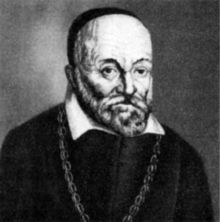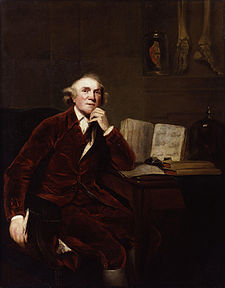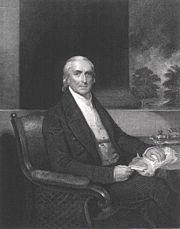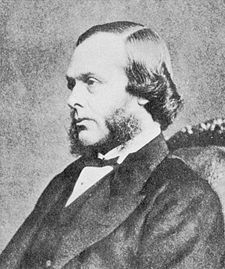
Father of modern surgery
Encyclopedia
Various individuals have advanced the surgical art
and, as a result, have been called the father of modern surgery by various sources.
; 936-1013), also called Abulcasis, wrote a 30-part medical encyclopedia in Arabic
. The last part of the encyclopedia, dealing with surgery, was later translated into Latin by Gerard of Cremona
. Al-zahrawi is called the "father of modern surgery".
(c. 1300-1368) is said by the Encyclopaedia Britannica to have been the most eminent surgeon of the European Middle Ages. He wrote the surgical work Chirurgia magna
, which was used as a standard text for some centuries. He has been called the "father of modern surgery".
(1517–1590) worked as a military doctor. He reformed the treatment of gunshot wounds, rejecting the practice, common at that time, of cauterizing the wound, and ligatured blood vessels in amputated limbs. His collected works were published in 1575. He has been called the "father of modern surgery".
(1537–1619) taught William Harvey
, and published a work on the valves of the veins. He has been called the "father of modern surgery".
(1728–1793) was known for his scientific, experimental approach to medicine and surgery. He has been called the "father of modern surgery".
(1768–1837) worked in Philadelphia and invented a number of new surgical methods and instruments. He has been called the "father of modern surgery".
(1827–1912) became well known for his advocacy of the use of carbolic acid (phenol) as an antiseptic, and was dubbed the "father of modern surgery" as a result.
(1829–1894) was an early user of antisepsis, and was the first to perform a resection of the esophagus, and various other operations. He has been called the "father of modern surgery".
(1852–1922) pioneered the radical mastectomy
, and designed a residency training program for American surgeons. He has been called "the most innovative and influential surgeon the United States has produced", and also the "father of modern surgery".
Surgery
Surgery is an ancient medical specialty that uses operative manual and instrumental techniques on a patient to investigate and/or treat a pathological condition such as disease or injury, or to help improve bodily function or appearance.An act of performing surgery may be called a surgical...
and, as a result, have been called the father of modern surgery by various sources.
Abu al-Qasim al-Zahrawi
Abu al-Qasim al-Zahrawi (born in Córdoba, SpainCórdoba, Spain
-History:The first trace of human presence in the area are remains of a Neanderthal Man, dating to c. 32,000 BC. In the 8th century BC, during the ancient Tartessos period, a pre-urban settlement existed. The population gradually learned copper and silver metallurgy...
; 936-1013), also called Abulcasis, wrote a 30-part medical encyclopedia in Arabic
Arabic language
Arabic is a name applied to the descendants of the Classical Arabic language of the 6th century AD, used most prominently in the Quran, the Islamic Holy Book...
. The last part of the encyclopedia, dealing with surgery, was later translated into Latin by Gerard of Cremona
Gerard of Cremona
Gerard of Cremona was an Italian translator of Arabic scientific works found in the abandoned Arab libraries of Toledo, Spain....
. Al-zahrawi is called the "father of modern surgery".
Guy de Chauliac
The Frenchman Guy de ChauliacGuy de Chauliac
Guy de Chauliac or Guigonis de Caulhaco was a French physician and surgeon who wrote a lengthy and influential treatise on surgery in Latin, titled Chirurgia Magna...
(c. 1300-1368) is said by the Encyclopaedia Britannica to have been the most eminent surgeon of the European Middle Ages. He wrote the surgical work Chirurgia magna
Chirurgia magna
Chirurgia magna , completed in 1363, is a guide of surgery and practical medicine. Its title indicates that it is a reference for surgery . Guy de Chauliac, Pope Clement VI's attending physician, compiled the information from his own field experience and research of historical medical texts...
, which was used as a standard text for some centuries. He has been called the "father of modern surgery".
Ambroise Paré
The French surgeon Ambroise ParéAmbroise Paré
Ambroise Paré was a French surgeon. He was the great official royal surgeon for kings Henry II, Francis II, Charles IX and Henry III and is considered as one of the fathers of surgery and modern forensic pathology. He was a leader in surgical techniques and battlefield medicine, especially the...
(1517–1590) worked as a military doctor. He reformed the treatment of gunshot wounds, rejecting the practice, common at that time, of cauterizing the wound, and ligatured blood vessels in amputated limbs. His collected works were published in 1575. He has been called the "father of modern surgery".
Hieronymus Fabricius
The Italian anatomist and surgeon Hieronymus FabriciusHieronymus Fabricius
Hieronymus Fabricius or Girolamo Fabrizio or by his Latin name Fabricus ab Aquapendende also Girolamo Fabrizi d'Acquapendente was a pioneering anatomist and surgeon known in medical science as "The Father of Embryology."...
(1537–1619) taught William Harvey
William Harvey
William Harvey was an English physician who was the first person to describe completely and in detail the systemic circulation and properties of blood being pumped to the body by the heart...
, and published a work on the valves of the veins. He has been called the "father of modern surgery".
John Hunter
The Scotsman John HunterJohn Hunter (surgeon)
John Hunter FRS was a Scottish surgeon regarded as one of the most distinguished scientists and surgeons of his day. He was an early advocate of careful observation and scientific method in medicine. The Hunterian Society of London was named in his honour...
(1728–1793) was known for his scientific, experimental approach to medicine and surgery. He has been called the "father of modern surgery".
Philip Syng Physick
The American surgeon Philip Syng PhysickPhilip Syng Physick
Philip Syng Physick was an American physician born in Philadelphia.-Biography:Physick graduated from the University of Pennsylvania in 1785, then began the study of medicine under Dr. Adam Kuhn, and continued it in London under Dr. John Hunter, becoming, on January 1, 1790, house surgeon of St....
(1768–1837) worked in Philadelphia and invented a number of new surgical methods and instruments. He has been called the "father of modern surgery".
Joseph Lister
The Englishman Joseph ListerJoseph Lister, 1st Baron Lister
Joseph Lister, 1st Baron Lister OM, FRS, PC , known as Sir Joseph Lister, Bt., between 1883 and 1897, was a British surgeon and a pioneer of antiseptic surgery, who promoted the idea of sterile surgery while working at the Glasgow Royal Infirmary...
(1827–1912) became well known for his advocacy of the use of carbolic acid (phenol) as an antiseptic, and was dubbed the "father of modern surgery" as a result.
Theodor Billroth
The German Theodor BillrothTheodor Billroth
Christian Albert Theodor Billroth was a German-born Austrian surgeon and amateur musician....
(1829–1894) was an early user of antisepsis, and was the first to perform a resection of the esophagus, and various other operations. He has been called the "father of modern surgery".
William Stewart Halsted
The American William Stewart HalstedWilliam Stewart Halsted
William Stewart Halsted was an American surgeon who emphasized strict aseptic technique during surgical procedures, was an early champion of newly discovered anesthetics, and introduced several new operations, including the radical mastectomy for breast cancer...
(1852–1922) pioneered the radical mastectomy
Radical mastectomy
Radical mastectomy is a surgical procedure in which the breast, underlying chest muscle , and lymph nodes of the axilla are removed as a treatment for breast cancer....
, and designed a residency training program for American surgeons. He has been called "the most innovative and influential surgeon the United States has produced", and also the "father of modern surgery".
Gallery
 |
 |
 |
 |
 |
 |
 |

